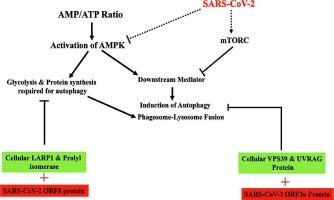AMP 激酶:有希望成为治疗 COVID-19 后并发症的药物靶点。
IF 5.2
2区 医学
Q1 MEDICINE, RESEARCH & EXPERIMENTAL
引用次数: 0
摘要
由 SARS-CoV-2 引起的 COVID-19 大流行导致了严重的呼吸系统问题和持续的并发症,尤其影响了糖代谢。无论是否患有糖尿病,患者的症状往往会加重,这凸显了对创新治疗方法的需求。AMPK 是细胞能量平衡的关键调节因子,在葡萄糖代谢、胰岛素敏感性和炎症反应中发挥着关键作用。通过异位或激酶依赖机制激活 AMPK 会影响葡萄糖摄取、脂肪酸氧化和自噬等细胞过程。AMPK 的组织特异性分布强调了它在维持全身代谢平衡中的作用。令人费解的是,SARS-CoV-2 感染会抑制 AMPK,导致代谢失调和 COVID-19 后并发症。辣椒素、姜黄素、植物雌激素、西洛他唑和莫莫迪苷等 AMPK 激活剂已证明具有调节 AMPK 活性的潜力。各种来源的化合物都能改善脂肪酸氧化和胰岛素敏感性,其中二甲双胍对 AMPK 激活的影响与病毒相反,这表明存在潜在的治疗选择。AMPK 激活的多种作用还包括其在对抗病毒感染中的作用,这进一步凸显了其在 COVID-19 中的重要性。本综述探讨了 AMPK 激活机制、其在代谢紊乱中的作用,以及针对 AMPK 的天然化合物在治疗 COVID-19 后并发症方面的潜在用途。此外,它还旨在回顾激活 AMPK 以预防 COVID-19 后糖尿病和心血管并发症的可能方法。它还探讨了利用天然化合物靶向 AMPK 通路的治疗效果。以 AMPK 激活为靶点是减轻 COVID-19 长期影响的一个很有前景的途径,为改善患者预后和生活质量带来了希望。本文章由计算机程序翻译,如有差异,请以英文原文为准。

AMP kinase: A promising therapeutic drug target for post-COVID-19 complications
The COVID-19 pandemic, caused by SARS-CoV-2, has resulted in severe respiratory issues and persistent complications, particularly affecting glucose metabolism. Patients with or without pre-existing diabetes often experience worsened symptoms, highlighting the need for innovative therapeutic approaches. AMPK, a crucial regulator of cellular energy balance, plays a pivotal role in glucose metabolism, insulin sensitivity, and inflammatory responses. AMPK activation, through allosteric or kinase-dependent mechanisms, impacts cellular processes like glucose uptake, fatty acid oxidation, and autophagy. The tissue-specific distribution of AMPK emphasizes its role in maintaining metabolic homeostasis throughout the body. Intriguingly, SARS-CoV-2 infection inhibits AMPK, contributing to metabolic dysregulation and post-COVID-19 complications. AMPK activators like capsaicinoids, curcumin, phytoestrogens, cilostazol, and momordicosides have demonstrated the potential to regulate AMPK activity. Compounds from various sources improve fatty acid oxidation and insulin sensitivity, with metformin showing opposing effects on AMPK activation compared to the virus, suggesting potential therapeutic options. The diverse effects of AMPK activation extend to its role in countering viral infections, further highlighting its significance in COVID-19. This review explores AMPK activation mechanisms, its role in metabolic disorders, and the potential use of natural compounds to target AMPK for post-COVID-19 complications. Also, it aims to review the possible methods of activating AMPK to prevent post-COVID-19 diabetes and cardiovascular complications. It also explores the use of natural compounds for their therapeutic effects in targeting the AMPK pathways. Targeting AMPK activation emerges as a promising avenue to mitigate the long-term effects of COVID-19, offering hope for improved patient outcomes and a better quality of life.
求助全文
通过发布文献求助,成功后即可免费获取论文全文。
去求助
来源期刊

Life sciences
医学-药学
CiteScore
12.20
自引率
1.60%
发文量
841
审稿时长
6 months
期刊介绍:
Life Sciences is an international journal publishing articles that emphasize the molecular, cellular, and functional basis of therapy. The journal emphasizes the understanding of mechanism that is relevant to all aspects of human disease and translation to patients. All articles are rigorously reviewed.
The Journal favors publication of full-length papers where modern scientific technologies are used to explain molecular, cellular and physiological mechanisms. Articles that merely report observations are rarely accepted. Recommendations from the Declaration of Helsinki or NIH guidelines for care and use of laboratory animals must be adhered to. Articles should be written at a level accessible to readers who are non-specialists in the topic of the article themselves, but who are interested in the research. The Journal welcomes reviews on topics of wide interest to investigators in the life sciences. We particularly encourage submission of brief, focused reviews containing high-quality artwork and require the use of mechanistic summary diagrams.
 求助内容:
求助内容: 应助结果提醒方式:
应助结果提醒方式:


